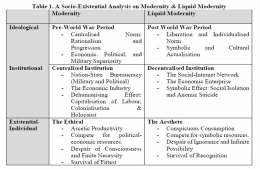Nevertheless, Kierkegaard proposed that readers should remain highly critical towards religion itself. Kierkegaard, although a Lutheran writer, spends most of his philosophical career criticising the Lutheran Church which he claims have prevented individuals from reaching authenticity (Religious stage), but remained in the form of ritualistic Christian practices (Ethical stage) at church and continues Borguiesse lifestyle at secular life (Aesthete stage) (Kierkegaard, 1968: 121-123). Kierkegaard’s critic towards the local religious institution of Denmark reminds us of how various social institution, secular or religious, tend to strain us into unauthentic identity. The author, echoes with Kierkegaard that the quest for authenticity still remains in this epoch.
Conclusion
This article attempts to describe the relation of knowledge and individual existence. The author has used the ideological, institutional, and existential level of analysis to compare the difference of Modernity and Liquid Modernity towards human experience. It is realised that modernity is associated with the ideological notion of rationalism and progress, institutional mechanism of bureaucracy and economic industry, existential characteristic of Ethical living. Liquid modernity is associated with the ideological notion of liberation and individualised norm, institutional mechanism of social network and economic enterprise, and the existential characteristic of Aesthete living. The quest for authenticity still remains a challenge as the cultural mentality of modernity and liquid modernity is insufficient to provide an existential satisfaction for the individual.
References
- Bauman, Zygmunt and Leonidas Donskis. 2013. Moral Blindness: The Loss of Sensitivity in Liquid Modernity. Polity Press.
- Bauman, Zygmunt. 1989. Modernity and Holocaust. Blackwell Publishing Ltd.
- Bauman, Zygmunt. 2000. Liquid Modernity. Polity Press.
- Bauman, Zygmunt. 2003. Liquid Love: On the Frailty of Human Bonds. Polity Press.
- Bauman, Zygmunt. 2005. Work, Consumerism, and the New Poor. Open University Press.
- Berger, Peter L. 1967. The Social Reality of Religion. Harmondsworth: Penguin Books Ltd.
- Botta, Marta. 2016. Neo-Collectivist Consciousness as a Driver of Transformative Sociocultural Change. Journal of Future Studies, Vol 21, No. 2, pp. 51-70.
- Braudillard, Jean. 2001. Seduction. CTheory Books.
- Campbell, Tom, Mark Davis, Jack Palmer. 2018. Hidden Paths in Zygmunt Bauman’s Sociology: Editorial Introduction. Theory, Culture & Society, Volume 0, No. 0, pp. 1-24.
- Cannon, Bob. 2016. Towards a Theory of Counter-Modernity: Rethinking Zygmunt Bauman’s Holocaust Writings. Critical Sociology, Vol 42, No 1: pp. 49-69.
- Evans, C. Stephen. 2004. Kierkegaard’s Ethic of Love: Divine Commands and Moral Obligations. Oxford University Press.
- Gane, Nicholas. 2001. Zygmunt Bauman: Liquid Modernity and Beyond. Acta Sociologica, Vol 44, N. 3: pp 267-275.
- Gary, Kevin. 2016. The Seduction of Kierkegaard’s Aesthetic Sphere. Philosophy of Education Society of Great Britain, Annual Conference: New College, Oxford.
- Giddens, Anthony. 1990. The Consequences of Modernity. Polity Press.
- Golomb, Jacob. 1995. In Search of Authenticity: Kierkegaard to Camus. Routledge.
- Hardt, Michael. 1999. Affective Labor. Duke University Press: Boundary.
- Jakway, Chris L. 1998. A Kierkegaardian Understanding of Self and Society: An Existential Sociology. Dissertation: Western Michigan University.
- Jeffries, Vincent. 2005. Pitirim A. Sorokin’s Integralism and Public Sociology. The American Sociologist. Vol 36(3/4): 66-87.
- Kalberg, Stephen. 2001. The Modern World as a Monolithic Iron Cage? Utilizing Max Weber to Define the Internal Dynamics of the American Political Culture Today. Max Weber Studies, Vol 1, No. 2, pp. 178-195.
- Kettler, David. 1967. Sociology of Knowledge and Moral Philosophy: The Place of Traditional Problems in the Formation of Mannheim’s Thought. Academy of Political Science, Vol 82, No. 3, pp. 399-426.
- Kierkegaard, Soren. 1968 (1854-1855). Attack Upon “Christendom”. Princeton University Press.
- Kierkegaard, Soren. Trans. 1980 (1849). The Sickness unto Death. Princeton University Press.
- Kierkegaard, Soren. Trans. 2009 (1846). Concluding Unscientific Postscript. Cambridge University Press.
- Lazzarato, Maurizio. From Capital Labour to Capital Life. Ephemera Theory & Politics in Organization, Vol 4, No. 3, pp 187-208.
- Luttikhuis, Bart, and Moses, Dirk. 2012. Mass Violence and the End of the Dutch Colonial Empire in Indonesia. Journal of Genocide Research, Volume 14, No. 3-4, pp. 257-276.
- Mannheim, Karl. Trans. 1979 (1936). Ideology and Utopia: An Introduction to the Sociology of Knowledge. Routledge & Kegan Paul: London and Henley.
- Petersen, M, J. 2003. Genocide and Modernity. Copenhagen University: Centre for African Studies.
- Scaff, L, A. 1987. Fleeing the Iron Cage: Politics and Culture in the Thought of Max Weber. The American Political Science Review, Vol. 81, No. 3: 737-756.
- Sorokin, Pitirim. 1957. Social & Cultural Dynamics: A Study of change in Major Systems of Art, Truth, Ethics, Law and Social Relationships. Boston: Porter Sargent Publisher.
- Speier, Hans. 1985. Karl Mannheim’s “Ideology and Utopia”. State, Culture, and Society, Vol. 1, No. 3, pp. 183-197.
- Stewart, Jon. 2011. Kierkegaard’s Influence on Social-Political Thought Volume 14. Routledge.
- Stewart, Jon. 2015. A Companion to Kierkegaard. Blackwell Publishing Ltd.
- Tiryakian, Edward A. 1965. Existential Phenomenology and the Sociological Tradition. American Sociological Review, Vol 30, No. 5, pp. 674-688.
- Weber, Max. 1978. Economy and Society: An Outline of Interpretative Sociology. Univesity of California Press.
- Weber, Max. 1992. The Protestant Ethic and The Spirit of Capitalism. Routledge Taylor & Francis Group.
- Westphal, Merold. 1996. Becoming a Self: A Reading of Kierkegaard’s Concluding Unscientific Postscript. Purdue University Research Foundation.












